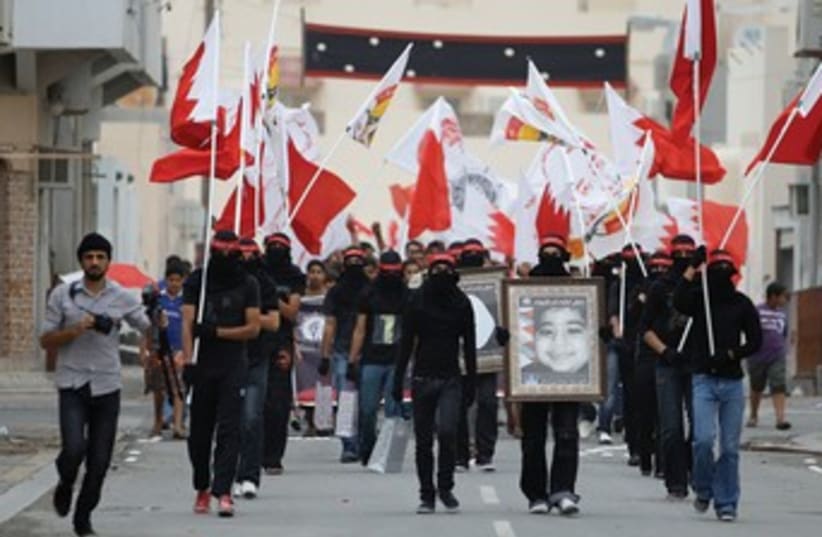Voices in Congress criticizes decision The decision was criticized by Senator Patrick Leahy, who wrote a provision Congress passed last year requiring the administration to consult lawmakers before allowing sales of teargas and other crowd-control items to governments of countries undergoing democratic transition in the Middle East."While I am pleased that the administration is continuing to withhold tear gas, small arms and other crowd-control items from the Bahraini security forces, this arms sale sends the wrong message," Leahy, a Democrat, said in a statement."The government of Bahrain has yet to respect the Bahraini people's legitimate demands, or to hold accountable its own police and military officers for arresting, torturing and killing Bahraini protesters," Leahy said.The resumption of military sales follows a visit to Washington this week by Bahrain Crown Prince Salman Hamid al-Khalifa, who met US Vice President Joe Biden, Secretary of State Hillary Clinton and Defense Secretary Leon Panetta."The Vice President expressed concern about the recent escalation of street violence, including attacks against security forces," the White House said. Biden also pressed on the importance of safeguarding human rights and of government accountability for past abuses, messages that were reinforced by Panetta, the Pentagon said.In October, the Obama administration delayed $53 million in planned sales to Bahrain pending the outcome of a local investigation into alleged human rights abuses since an uprising began in February 2011.Bahrain has been the host of US naval headquarters in the Gulf for more than 60 years and is seen as a central bulwark for US efforts to deter Iran.Human rights advocates have criticized Washington for its muted response to Bahrain's crackdown contrasted with strong US public support for popular protests in Egypt, Tunisia and Syria.The State Department said Bahrain's government had taken steps to implement reforms but that "the country is becoming increasingly polarized and much work remains to be done.""We are concerned about excessive use of force and tear gas by police. At the same time, we are concerned by the almost daily use of violence by some protesters," the statement said, urging both sides to refrain from incitement.The Obama administration has been under pressure to stick by Bahrain's ruling family, notably from Sunni-led Saudi Arabia and other members of the Gulf Cooperation Council, in the face of protests by the country's Shi'ites.
US resumes Bahrain arms sales despite rights concerns
State Department says equipment approved for key Gulf ally facing Iran not used for "crowd control."

Voices in Congress criticizes decision The decision was criticized by Senator Patrick Leahy, who wrote a provision Congress passed last year requiring the administration to consult lawmakers before allowing sales of teargas and other crowd-control items to governments of countries undergoing democratic transition in the Middle East."While I am pleased that the administration is continuing to withhold tear gas, small arms and other crowd-control items from the Bahraini security forces, this arms sale sends the wrong message," Leahy, a Democrat, said in a statement."The government of Bahrain has yet to respect the Bahraini people's legitimate demands, or to hold accountable its own police and military officers for arresting, torturing and killing Bahraini protesters," Leahy said.The resumption of military sales follows a visit to Washington this week by Bahrain Crown Prince Salman Hamid al-Khalifa, who met US Vice President Joe Biden, Secretary of State Hillary Clinton and Defense Secretary Leon Panetta."The Vice President expressed concern about the recent escalation of street violence, including attacks against security forces," the White House said. Biden also pressed on the importance of safeguarding human rights and of government accountability for past abuses, messages that were reinforced by Panetta, the Pentagon said.In October, the Obama administration delayed $53 million in planned sales to Bahrain pending the outcome of a local investigation into alleged human rights abuses since an uprising began in February 2011.Bahrain has been the host of US naval headquarters in the Gulf for more than 60 years and is seen as a central bulwark for US efforts to deter Iran.Human rights advocates have criticized Washington for its muted response to Bahrain's crackdown contrasted with strong US public support for popular protests in Egypt, Tunisia and Syria.The State Department said Bahrain's government had taken steps to implement reforms but that "the country is becoming increasingly polarized and much work remains to be done.""We are concerned about excessive use of force and tear gas by police. At the same time, we are concerned by the almost daily use of violence by some protesters," the statement said, urging both sides to refrain from incitement.The Obama administration has been under pressure to stick by Bahrain's ruling family, notably from Sunni-led Saudi Arabia and other members of the Gulf Cooperation Council, in the face of protests by the country's Shi'ites.